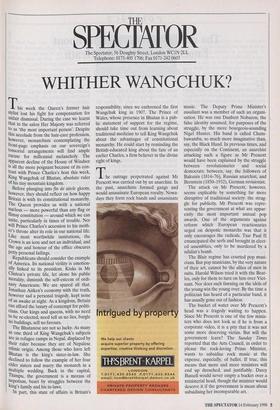SPECT ME AT OR The Spectator, 56 Doughty Street, London WC1N 2LL
Telephone: 0171-405 1706; Fax 0171-242 0603
WHITHER WANGCHUK?
This week the Queen's former hair stylist lost his fight for compensation for unfair dismissal. During the case we learnt that in the salon Her Majesty was referred to as 'the most important person'. Despite this accolade from the hair-care profession, however, monarchists contemplating the front-page emphasis on our sovereign's tonsorial arrangements will find ample excuse for millennial melancholy. The apparent decline of the House of Windsor is all the more poignant because of its con- trast with Prince Charles's host this week, King Wangchuk of Bhutan, absolute ruler of his tiny mountain kingdom. Before plunging into fin de siecle gloom, however, they should reflect on how happy Britain is with its constitutional monarchy. The Queen provides us with a national nucleus — more powerful than any flag or flimsy constitution — around which we can Unite, particularly in times of trouble. Nor will Prince Charles's accession to his moth- er's throne alter its role in our national life. Like most worthwhile institutions, the Crown is an icon and not an individual, and the age and honour of the office obscures petty personal failings. Republicans should consider the example of America. Its national virility is emotion- ally linked to its president. Kinks in Mr Clinton's private life, let alone his public morality, diminish the self-esteem of ordi- nary Americans. We are spared all that. Jonathan Aitken's economy with the truth, however sad a personal tragedy, kept none of us awake at night. As a kingdom, Britain Can afford the luxury of contempt for politi- cians. Our kings and queens, with no need to be re-elected, need tell us no lies, burgle no buildings, sell no favours. The Bhutanese are not so lucky. As many as one third of King Wangchuk's subjects are in refugee camps in Nepal, displaced by their ruler because they are of Nepalese ethnic origin. Among those who have left Bhutan is the king's sister-in-law. She declined to follow the example of her four elder sisters and marry the monarch in a multiple wedding. Back in the capital, Thimpu, the government is a morass of nepotism, beset by struggles between the king's family and his in-laws.
In part, this state of affairs is Britain's responsibility, since we enthroned the first Wangchuk king in 1907. The Prince of Wales, whose presence in Bhutan is a pub- lic statement of support for the regime, should take time out from learning about traditional medicine to tell King Wangchuk about the advantages of constitutional monarchy. He could start by reminding the British-educated king about the fate of an earlier Charles, a firm believer in the divine right of kings.
The outrage perpetrated against Mr Prescott was carried out by an anarchist. In the past, anarchists formed gangs and would assassinate European royalty. Nowa- days they form rock hands and assassinate music. The Deputy Prime Minister's assailant was a member of such an organi- sation. He was one Danbert Nobacon, the false identity assumed, for purposes of the struggle, by the more bourgeois-sounding Nigel Hunter. His band is called Chum- bawamba, so much more imaginative than, say, the Black Hand. In previous times, and especially on the Continent, an anarchist attacking such a figure as Mr Prescott would have been explained by the struggle between revolutionaries and social democrats; between, say, the followers of Bakunin (1814-76), Russian anarchist, and Bernstein (1850-1932), German revisionist.
The attack on Mr Prescott, however, seems explicable by something far more disruptive of traditional society: the strug- gle for publicity. Mr Prescott was repre- senting the government at what are appar- ently the most important annual pop awards. One of the arguments against reform which European reactionaries urged on despotic monarchs was that it only encourages the radicals. Tsar Paul II emancipated the serfs and brought in elect- ed assemblies, only to be murdered by a nihilist's bomb.
The Blair regime has courted pop musi- cians. But pop musicians, by the very nature of their art, cannot be the allies of men in suits. Harold Wilson tried it with the Beat- les, only for them to turn on him over Viet- nam. Nor does such fawning on the idols of the young win the young over. By the time a politician has heard of a particular band, it has usually gone out of fashion.
The bucket of water over Mr Prescott's head was a tragedy waiting to happen. Since Mr Prescott is one of the few minis- ters who does not look as if he is from a corporate video, it is a pity that it was not some more deserving victim. But will the government learn? The Sunday Times reported that the Arts Council, in order to please the rock-loving Prime Minister, wants to subsidise rock music at the expense, especially, of ballet. If true, this means that more and more ministers will end up drenched, and justifiably. Darcy Bussell would never empty a bucket over a ministerial head, though the minister would deserve it if the government is mean about subsidising her incomparable art.

























































 Previous page
Previous page